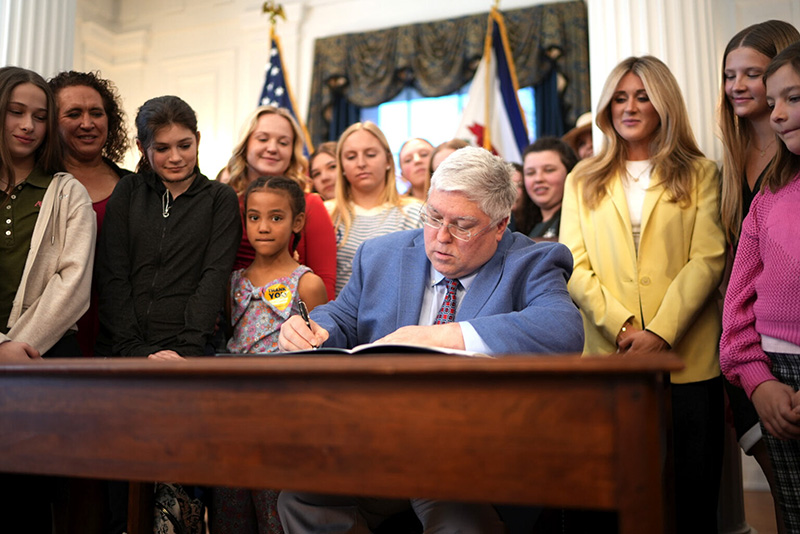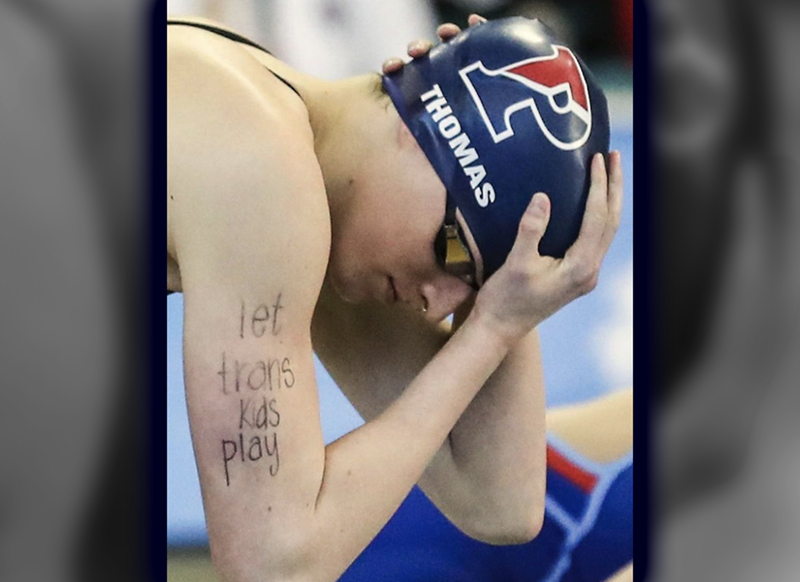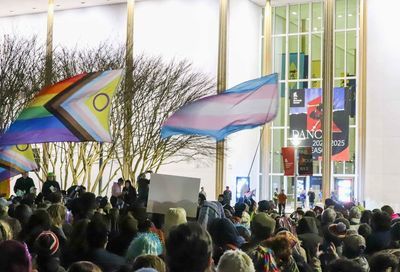Veterans Affairs seeking to allow transgender veterans to receive medically necessary care
VA will undertake a two-year process to rewrite policy eliminating exclusions on gender confirmation surgery.

On Saturday, Veterans Affairs Secretary Denis McDonough announce that the VA will be pushing for a rule change to allow transgender veterans to access gender-affirming health care, including gender confirmation surgery, that is deemed medically necessary.
Speaking at a Pride Month event for transgender veterans at the Orlando VA Healthcare System in Florida, McDonough promised to overcome the “dark history” of discrimination against the transgender community and take steps to ensure they can access the care they need.
McDonough’s announcement marks a reversal from the Trump administration, which adopted a ban that resulted in the majority of transgender people being declared ineligible to serve in the military, a policy that was reversed by President Joe Biden soon after taking office earlier this year.
Under the Trump ban, active-duty transgender people could not receive a diagnosis of gender dysphoria and could not pursue gender confirmation surgery, although a small minority of transgender service members who had previously undergone surgery were “grandfathered” in and allowed to continue serving. Former President Trump also claimed that the cost of gender confirmation surgeries would be exorbitant and that allowing transgender service members to undergo gender confirmation surgery would hurt morale and unit cohesion.
The announcement also marks a departure from the policy under President Obama, in which the VA instituted a ban on providing gender confirmation surgery, thereby forcing transgender veterans to pay out of pocket if they wished to pursue surgery, even if their medical provider deemed it “medically necessary.”
“[This is] allowing transgender vets to go through the full gender confirmation process with VA by their side,” McDonough said in prepared remarks. “We’re making these changes not only because they are the right thing to do, but because they can save lives.”
The reversal of the existing ban on gender confirmation surgery will be a two-year process — including a period for public comment — expected to begin this summer, in which the department will create a new federal rule aimed at changing current policy, a spokesman told The Washington Post.
“This time will allow VA to develop capacity to meet the surgical needs that transgender veterans have called for and deserved for a long time, and I am proud to begin the process of delivering it,” McDonough said in his remarks.
He also called the policy change a matter of finding the best way to serve veterans’ needs.
“LGBTQ+ veterans experience mental illness and suicidal thoughts at far higher rates than those outside their community,” McDonough said. “But they are significantly less likely to seek routine care, largely because they fear discrimination. At VA, we’re doing everything in our power to show veterans of all sexual orientations and gender identities that they can talk openly, honestly and comfortably with their health care providers about any issues they may be experiencing.”
See also: Top medical organization: “No medically valid” reason to exclude transgender service members
Since 2016, all VA facilities have had a local LGBT Veteran Care Coordinator responsible for helping those veterans connect to available services, reports The Military Times.
While the National Center for Transgender Equality estimates that there are more than 134,000 transgender veterans in the United States, and another 15,000 active-duty transgender individuals in the Armed Forces, VA officials estimate that only about 4,000 veterans would actually pursue surgical interventions. In fact, many transgender people, even if diagnosed with gender dysphoria, choose to forego gender confirmation surgery, instead relying on hormone therapy and other treatments to assist in their transition.
The total cost of the surgeries that those 4,000 veterans would undertake is unknown, although a 2015 study published in the New England Journal of Medicine, estimated cost of providing hormone therapy or surgery for transgender service members would be about $5.6 million each year, or “little more than a rounding error in the military’s $47.8 billion health care budget,” according to the study’s authors.
LGBTQ advocates and political allies in Congress praised McDonough’s announcement.
“Everyone should have access to the health care they need to live healthy, happy lives,” Mara Keisling, the executive director for the National Center for Transgender Equality, said in a statement. “We know that this is just the beginning of a long process, but it’s another step in the Biden administration’s effort to fight discrimination against transgender people, including our transgender veterans. Every veteran deserves to have access to the health care that they need, and the VA is working to make sure that includes transgender veterans as well.”
“Transgender veterans have earned the right to the accepted, medically necessary procedures and protocols prescribed by their health care providers without being subject to discrimination based on gender identity,” Ann Murdoch, the president of the Transgender American Veterans Association, said in a statement. “TAVA applauds VA Secretary Denis McDonough for announcing the proposed rule change and for his commitment to equality for all of America’s veterans.”

House Veterans’ Committee Chairman Mark Takano (D-Calif.) and U.S. Rep. David Cicilline (D-R.I.), the co-chairs of Equality PAC, the political arm of the Congressional LGBTQ Equality Caucus, praised the forthcoming rule change.
“After bravely serving and defending our nation, America’s veterans have earned the right to unfettered access to all types of medical care,” Takano and Cicilline said in a statement. “This includes those who are transgender and who will now have access to gender reassignment surgeries at VA facilities. Choosing to undergo gender reassignment surgery is a deeply personal decision that allows individuals to live as their authentic selves. We have a responsibility to provide this option for all Americans, especially for our veterans.”
Takano added that under the previous ban, veterans who were transgender were forced to “seek health care outside of the VA health system and navigate complicated processes to get the care they need.”
Similarly, Senate Veterans’ Affairs Committee Chairman Jon Tester (D-Mont.) said that “every service member and veteran deserves equal access to quality care from the VA,” including LGBTQ veterans.
But Takano’s Republican counterpart, U.S. Rep. Mike Bost (Ill.) criticized the Biden administration of trying to win “the culture wars.”
“This announcement clearly has more to do with advancing a radical liberal agenda than serving veterans,” he said. “It is a disgrace. This administration should rethink their priorities immediately.”
See also: Transgender service members react to repeal of Trump military ban
Sarah Kate Ellis, the president and CEO of the LGBTQ media advocacy organization GLAAD, praised the announcement as “not only an overdue victory for transgender veterans, but the latest move from Secretary McDonough and the VA in affirming LGBTQ veterans.”
Aaron Belkin, the director of the Palm Center, which advocates for the inclusion of LGBTQ service members in the U.S. military, cheered on the plan to allow veterans to access to gender-affirming care.
“VA’s important new policy revision delivers on our country’s legal and moral commitment to take care of all veterans, eliminating the discriminatory exclusion denying medically necessary care to transgender veterans,” Belkin said in a statement.
“Health care for our veterans should be based on a single standard of care rooted in equity and fairness. This principle is already established by VA’s medical benefits package, which requires the department to provide eligible veterans with health care that accords with widely accepted standards of medical practice,” he added. “The consensus of the American Medical Association, American Psychological Association, American Psychiatric Association, and six former U.S. Surgeons General is that transgender-inclusive health care clearly meets those requirements. The new policy will bring VA’s health care for transgender veterans in line with the medical community’s standard of care.”
See also:
Justice Department files statements of interest in two transgender cases
Support Metro Weekly’s Journalism
These are challenging times for news organizations. And yet it’s crucial we stay active and provide vital resources and information to both our local readers and the world. So won’t you please take a moment and consider supporting Metro Weekly with a membership? For as little as $5 a month, you can help ensure Metro Weekly magazine and MetroWeekly.com remain free, viable resources as we provide the best, most diverse, culturally-resonant LGBTQ coverage in both the D.C. region and around the world. Memberships come with exclusive perks and discounts, your own personal digital delivery of each week’s magazine (and an archive), access to our Member's Lounge when it launches this fall, and exclusive members-only items like Metro Weekly Membership Mugs and Tote Bags! Check out all our membership levels here and please join us today!


























You must be logged in to post a comment.